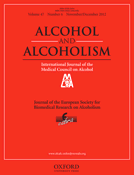
ALCOHOL AND ALCOHOLISM
Scope & Guideline
Illuminating the Path to Understanding Alcoholism
Introduction
Aims and Scopes
- Alcohol Use Disorders (AUD):
The journal consistently addresses the prevalence, risk factors, and treatment outcomes associated with AUD, emphasizing the importance of early identification and intervention strategies. - Impact of Alcohol on Physical and Mental Health:
Research published in the journal explores the physiological and psychological consequences of alcohol consumption, including its role in various health conditions such as liver disease, cancer, and mental health disorders. - Pharmacotherapy and Behavioral Interventions:
The journal includes studies on pharmacological treatments and behavioral interventions for alcohol use disorders, evaluating their effectiveness and suggesting novel therapeutic approaches. - Societal and Cultural Impacts of Alcohol Consumption:
Articles often investigate the societal implications of alcohol use, including marketing influences, public health policies, and cultural attitudes toward drinking. - Emerging Trends and Public Health Concerns:
The journal highlights contemporary issues such as the effects of the COVID-19 pandemic on drinking behavior, alcohol consumption patterns in specific populations, and the intersection of alcohol use with socio-economic factors.
Trending and Emerging
- Impact of COVID-19 on Alcohol Consumption:
A notable trend is the exploration of how the COVID-19 pandemic has influenced drinking behaviors, mental health, and access to treatment, highlighting the pandemic's lasting effects on public health. - Digital Interventions for Alcohol Use Disorder:
There is a growing body of research focused on digital health interventions aimed at reducing alcohol consumption, particularly among younger populations, emphasizing the role of technology in treatment. - Microbiome and Alcohol Use Disorder:
Emerging studies are investigating the relationship between the gut microbiome and alcohol use disorders, suggesting new avenues for understanding the biological underpinnings of AUD. - Social Media and Alcohol Use:
Research examining the role of social media in shaping drinking behaviors and attitudes has gained traction, reflecting the influence of digital environments on alcohol consumption. - Gender and Alcohol Research:
There is an increasing focus on the nuances of alcohol use across different genders, including the effects of societal pressures and gender-specific health outcomes.
Declining or Waning
- Alcohol and Cancer Associations:
Research specifically linking alcohol consumption to various types of cancer has diminished, possibly due to a growing emphasis on other health impacts of alcohol. - Traditional Alcohol Use Patterns:
Studies focusing on historical drinking patterns or traditional alcohol consumption behaviors appear less frequently, indicating a shift towards more contemporary issues. - Alcohol and Aging:
While there has been interest in the effects of alcohol on older populations, this specific focus has waned as newer studies explore broader demographic impacts and social determinants of health.
Similar Journals
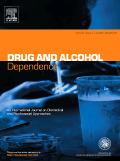
DRUG AND ALCOHOL DEPENDENCE
Advancing knowledge on substance use disorders.Drug and Alcohol Dependence is a premier journal published by Elsevier Ireland Ltd, dedicated to the rigorous exploration and analysis of substance use disorders, including drug and alcohol dependencies. With its established history since 1975 and a remarkable convergence of research extending to 2024, the journal holds a prestigious position within the academic community, evidenced by its Q1 ranking in multiple categories, including Pharmacology, Psychiatry and Mental Health, and Toxicology for 2023. It ranks impressively among its peers, underscored by Scopus rankings of #46, #99, and #27 in key fields related to medical pharmacology and toxicology. As a non-open access title, it caters to a global readership of researchers, professionals, and students, providing them with peer-reviewed insights into critical developments and innovative methodologies in the field. The journal’s commitment to advancing knowledge and understanding of drug and alcohol dependence is essential for addressing the global challenges posed by substance use, making it a valuable resource for all stakeholders in public health and clinical practice.

ACTA PSYCHIATRICA SCANDINAVICA
Exploring Groundbreaking Insights in PsychiatryACTA PSYCHIATRICA SCANDINAVICA is a leading journal in the field of Psychiatry and Mental Health, published by Wiley since its inception in 1926. With a strong commitment to advancing psychiatric research, this esteemed journal boasts an impressive impact factor and ranks within the top 7% of its category, reflecting its influence and relevance in the field. Operating without an Open Access model, the journal serves as a vital resource for professionals, researchers, and students keen on accessing high-quality, peer-reviewed studies focused on mental health issues. The scope of ACTA PSYCHIATRICA SCANDINAVICA spans a broad spectrum of psychiatric topics, providing a platform for groundbreaking research and clinical practice insights. Based in the United Kingdom and featuring contributions from experts worldwide, the journal continues to shape the future of psychiatric research through its rigorous publication standards and commitment to scholarly excellence.

Nordic Studies on Alcohol and Drugs
Transforming Perspectives on Alcohol and Drug ConsumptionNordic Studies on Alcohol and Drugs is a leading peer-reviewed journal published by SAGE PUBLICATIONS LTD, dedicated to advancing the understanding of alcohol and drug use from a Nordic perspective. Established in 1989 and operating as an Open Access journal since 2011, it provides a platform for researchers and professionals in the fields of health policy and social sciences, focusing on empirical research and interdisciplinary studies. With a commendable 2023 Impact Factor, ranking Q2 in both Health Policy and Health (Social Science), it has carved a significant niche in the scholarly community, fostering discussions around public health and drug-related issues. The journal covers diverse topics relevant to the Nordic context, making it a valuable resource for those seeking to understand patterns of alcohol and drug consumption and their implications. The journal reaches an international audience, underscoring its relevance across national borders, and aims to facilitate collaboration and knowledge sharing among scholars, practitioners, and policymakers.

ALCOHOL-CLINICAL AND EXPERIMENTAL RESEARCH
Contributing to the future of addiction and public health knowledge.ALCOHOL-CLINICAL AND EXPERIMENTAL RESEARCH, published by WILEY, is a leading peer-reviewed journal dedicated to advancing the understanding of alcohol use and its clinical implications. With an impressive impact factor and categorized in the top quartile (Q1) in Medicine (miscellaneous), Psychiatry and Mental Health, and Toxicology, this journal serves a crucial role in disseminating high-quality research that informs clinical practice and health policy. The journal’s scope encompasses a wide range of topics related to alcohol use, including its effects on mental health, addiction, and public health, providing a vital platform for professionals, researchers, and students committed to enhancing knowledge in the field. The journal operates in the United States and is known for its rigorous editorial standards, ensuring that published articles contribute valuable insights to ongoing discussions in medicine and behavioral health. As of 2023-2024, the journal continues to thrive in a competitive academic landscape, aiming to foster collaboration and innovation in alcohol-related research.
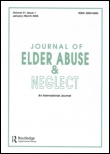
JOURNAL OF ELDER ABUSE & NEGLECT
Advancing Knowledge to Combat Elder AbuseJournal of Elder Abuse & Neglect, published by Routledge Journals, Taylor & Francis Ltd, serves as a vital platform for scholars, practitioners, and policy-makers in the fields of geriatrics, gerontology, and social sciences. Since its inception in 1988, this peer-reviewed journal has committed itself to addressing the pressing issues surrounding elder abuse and neglect, providing critical insights into prevention strategies, intervention methods, and the sociocultural factors affecting the older population. With an impressive impact factor reflecting its relevance—holding a Q2 ranking in Social Sciences and a Q3 ranking in Geriatrics and Gerontology as of 2023—the journal ensures that high-quality research can significantly influence policy and practice. Researchers eager to deepen their understanding of elder-related issues will find invaluable resources in its comprehensive articles, while professionals will benefit from evidence-based solutions applicable in real-world contexts. Though not openly accessible, the journal can be accessed through institutions subscribed to Routledge journals, ensuring that the wealth of knowledge it offers is within reach for those dedicated to the welfare of aging populations. As it continues to evolve, Journal of Elder Abuse & Neglect remains an essential touchstone for cutting-edge research and practice in elder care.
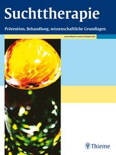
Suchttherapie
Fostering Knowledge for a Healthier TomorrowSuchttherapie, an esteemed journal published by GEORG THIEME VERLAG KG, serves as a critical platform within the fields of Applied Psychology and Psychiatry and Mental Health. Established in 2000 and continuing through 2024, this journal is committed to advancing the understanding and treatment of addiction and related psychological issues. Although it currently stands in the Q4 Quartile ranking and is categorized as low percentile in both Scopus Ranks and impact metrics, its significance lies in its dedication to disseminating cutting-edge research and clinical findings that contribute to the evolving landscape of therapeutic practices. Published in Germany, the journal facilitates unlimited access to the vital discourse surrounding mental health and addiction treatment, making it a valuable resource for researchers, professionals, and students alike seeking to enhance their knowledge and skills in this important area of study. As the field continues to grow, Suchttherapie plays a pivotal role in bridging practice with academic rigor, ensuring that readers remain informed on the latest methodologies and insights.

Substance Abuse and Rehabilitation
Advancing knowledge for a healthier tomorrow.Substance Abuse and Rehabilitation, published by DOVE MEDICAL PRESS LTD, is a leading open-access journal dedicated to the study and treatment of substance abuse and related rehabilitation practices. With its ISSN 1179-8467, this journal provides a vital platform for researchers, clinicians, and students to disseminate their findings and insights in a field increasingly relevant to public health. Since becoming open access in 2010, the journal has enhanced its reach, allowing for a broader audience to engage with cutting-edge research and reviews that address the complexities of substance abuse disorders. The journal aims to foster innovation and interdisciplinary collaboration by publishing high-quality peer-reviewed articles that cover a wide range of topics, including addiction therapy, policy implications, and the social determinants of substance use. As a vital resource within the realm of addiction research, Substance Abuse and Rehabilitation plays a crucial role in driving forward knowledge and practices that can improve outcomes for individuals and communities affected by substance use issues.
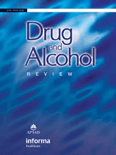
DRUG AND ALCOHOL REVIEW
Innovating research for a healthier tomorrow.DRUG AND ALCOHOL REVIEW, published by Wiley, is a leading journal dedicated to advancing the scholarship in the fields of drug and alcohol research. Since its inception in 1989, this esteemed publication has provided a critical platform for the dissemination of innovative research findings, reviews, and theoretical papers, addressing pressing issues in substance use and addiction. With an impact factor that places it in the Q1 category in both Health (social science) and Medicine (miscellaneous), it ranks #78 out of 371 in the Scopus index for Health and #115 out of 398 in Medicine, reflecting its significant influence and high citation rates among scholars. The journal is committed to fostering a multidisciplinary approach, integrating perspectives from psychology, sociology, public health, and medicine, to inform policy and practice. Accessible to researchers and practitioners alike, *DRUG AND ALCOHOL REVIEW* serves as an essential resource for anyone invested in understanding and addressing the complexities of drug and alcohol use in society.

Alcohol Research-Current Reviews
Empowering research to shape alcohol policy and prevention.Alcohol Research-Current Reviews is a pivotal journal dedicated to advancing the understanding of alcohol-related issues and promoting scientific discourse in the fields of addiction and public health. Published by the National Institute on Alcohol Abuse and Alcoholism, this journal serves as a comprehensive platform that consolidates contemporary reviews on a wide array of topics related to alcohol, including its biological effects, societal implications, and prevention strategies. Despite its coverage in Scopus being discontinued, the journal remains a respected resource among researchers and practitioners, supporting the dissemination of important findings and fostering ongoing education in alcohol research. The open access option ensures that valuable research is readily available to an expansive audience, further enhancing the journal's impact in the academic community. With a ISSN of 1535-7414 and E-ISSN 1930-0573, the journal is committed to providing high-quality, peer-reviewed content that informs and influences public policy and health interventions.
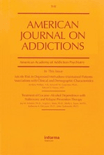
AMERICAN JOURNAL ON ADDICTIONS
Innovating Solutions for Addiction ChallengesThe AMERICAN JOURNAL ON ADDICTIONS, published by WILEY, stands as a premier publication within the realms of Clinical Psychology, Medicine, and Psychiatry. With its ISSN 1055-0496 and E-ISSN 1521-0391, the journal has been a critical resource since its inception in 1992, consistently evolving to encompass a wide scope of addiction research and its implications on public health. Renowned for its rigorous peer-reviewed articles, it boasts impressive rankings, including Q1 status in both Clinical Psychology and Medicine (miscellaneous) for 2023, and a respectable Q2 in Psychiatry and Mental Health. As a foundational platform for disseminating cutting-edge research, the journal aims to facilitate the exchange of knowledge among researchers, healthcare professionals, and educators alike. Its significant impact on the academic community is underscored by its Scopus rankings—placing it in the top 26% of Clinical Psychology journals and the top 28% in Medicine (miscellaneous). By fostering an understanding of addiction and its treatments, the AMERICAN JOURNAL ON ADDICTIONS plays an essential role in guiding innovative practices and shaping future policies within the field.